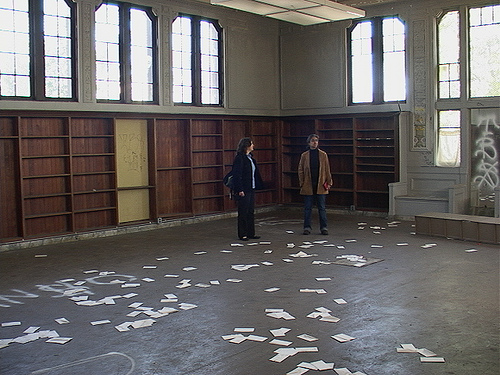
Before I start here, I want to make one thing clear: I love libraries. They have been a haven and a treasure trove to me since I was young. Whatever I may say in this post about the future of libraries, please know that it’s not because I want anything bad to happen to them.
Primarily I love libraries because they’re places we’ve created as communities to share the written word. Few things in life, it seems to me, are cooperative, highly useful, and (in a limited sense) free.
If libraries were to end, I also would hate to think of communities losing that anchor of identity, of the waste of beautiful buildings, of paper volumes being shredded or dumped or moldering away, and of librarians (who in my experience are disproportionately great people) cast off into unemployment.
Yet my honest sense is that libraries, by and large, are doomed.
What changed?
Maybe “what’s changed?” is the wrong question: after all, we all know what changed–or to be more accurate, is in the process of changing right now. It’s eBooks. Since before the Sumerians started making marks in clay 5,000 years ago, the written word has been intimately bound with physical objects. As personal computers and later other devices started to become more common, certainly a lot of electronic words sprang into being, but most of us don’t want to use a computer to read: it’s just not physically comfortable, and sometimes it’s not practical. So while magazines and newspapers have been feeling the dark tendrils of obsolescence grope at them for a decade or more, until recently bookstores and libraries were largely unaffected.
In fact libraries expanded to embrace the availability of electronic media, adapting to offer computer terminals, free wi-fi, and online resources.
Now, though, eReaders have begun taking hold. This mundane-looking type of device with its limited features and lack of any sense of glitz has been quietly stealing away reader after reader from physical books (and some other printed media). I was stolen away about a year ago, when a friend bought me a Kindle. I thought I would really miss physical books. I was pretty much wrong.
I know there’s debate over whether eBooks can replace physical books. People make good points like the physical experience of reading a book or the ability to hand a physical copy of a book to a friend. It’s certainly true that there are some nice things about physical books. Not the trees mowed down to produce them or the excruciating returns procedures the publishing industry is locked into or the storage space requirements, but certainly the satisfaction of having a physical object that represents a wonderful experience, the ability to leave books lying around for children to stumble upon, the ability to pass along stories ideas by handing something to someone.
Yet having looked at the issue in great detail, I have to conclude that eBooks are going to almost completely replace physical books within the decade. You may disagree with me, but if you care about libraries, you may want to pretend for the moment that you grant the point and explore with me what this might mean, since if I’m right, libraries may have to change now if they are going to have any chance of surviving.
As with physical books, so with libraries
Although libraries were created to store and share physical books, they’ve adapted beautifully to new media. First reel-to-reel audio and films, then cassette tapes and video tapes, then CDs and DVDs became staple items at libraries. Libraries often provide free access to the Web and have a library Web site where you can look up books. The old card catalogs have turned into searchable databases. Microfilm and microfiche have yielded to digital storage.
Yet libraries are still tied to a physical experience in a specific place. The entire reason municipal libraries are funded in the first place is to benefit local citizens. While it’s true that you can get digital media from libraries–as with some eBook borrowing programs–you can also get digital media from a lot of other sources, and you don’t have to go to the physical library to get these in most cases anyway. Vermont librarian Kata Welch recently commented, ” If people want e-books, libraries will find a way to supply them and meet their patrons’ needs.” I think she’s right that libraries are more than able to accomplish this–but I don’t think libraries can survive this way.
After all, what’s the use of a physical building when you’re sharing materials that can be easily shared with someone at any other location? And what’s the use of a small local library online if there are thousands of other small local libraries online? If libraries take this approach of still being a source for sharing written and other media, but in electronic rather than physical form, then first they’ll be forced out of buildings and onto the Web, then they’ll inevitably join forces with other libraries because the economies of scale are so significant, and eventually the services will be so widespread that any sense of locality will be utterly lost–if the approach even survives at all. Given all the free material (books, stories, blogs, and so on) that’s available for eReaders and how easy and sometimes inexpensive it is to buy eBooks, I’m not convinced that many people will continue to rely on borrowing books at all, regardless of form.
But libraries are more than books!
It’s true, libraries are more than books. The problem is that sharing media–books, films, audio recordings, magazines, etc.–is the essential, core service that libraries provide. If libraries are no longer mainly about providing that service, can municipalities continue to justify paying as much as they do for them? How many people would use them? Enough to justify the space and expense?
I think there’s one way many libraries might be able to survive, but it would take a lot of effort and change and still wouldn’t succeed everywhere. I’ll talk about that in my follow-up post in the next day or two.
Photo by aaron.michels
Like this:
Like Loading...








